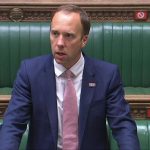Chancellor Kwasi Kwarteng’s debt-cutting plan will be published on 31 October – three weeks earlier than planned – alongside an independent economic forecast, the Treasury has confirmed.
Both the publication of the medium-term financial plan and the forecast by the Office for Budget Responsibility (OBR) had been due on 23 November, but the chancellor has bowed to pressure to bring this date forward to Halloween.
Financial markets responded badly to the chancellor’s mini-budget last month, with the pound falling to a record low.
Mr Kwarteng had been facing growing calls to produce his fiscal statement which will outline how the government intends to pay for the £43bn worth of tax cuts in the mini-budget and how they plan to reduce debt.
Sunak ally welcomes ministerial appointment – Politics latest
Writing to Treasury Select Committee Chairman Mel Stride, Mr Kwarteng said: “I have previously written to inform you that an economic and fiscal forecast will be published alongside the Medium-Term Fiscal Plan on 23 November. I have decided to bring this date forward to 31 October.”
The chancellor adds that the revised date “will allow for a full forecast process to take place to a standard that satisfies the legal requirements of the Charter for Budget Responsibility” which “provides an in-depth assessment of the economy and public finances”.
Decision on whether to raise benefits in line with inflation expected in November, minister says – as Liz Truss remains ‘genuinely undecided’
Nadhim Zahawi warns Tories ‘dither or delay will end in defeat’ as he urges party to unite
Sophy Ridge on Sunday podcast: Nadhim Zahawi, Jonathan Ashworth, and Angus Robertson
He added: “And it will provide time for the Medium-Term Fiscal Plan to be finalised.”
The chancellor’s fiscal statement will now be published prior to the Bank of England announcing its latest decision on interest rates on 3 November.
Responding to the chancellor’s letter, Mr Stride welcomed the move, saying the publication of both the government’s debt-cutting plan and independent economic forecast on 31 October may result in a smaller rise in interest rates which is “critical to millions” of mortgage holders.
Former cabinet minister Grant Shapps called it a “belated but sensible move”.
While the SNP’s Pete Wishart warned that Prime Minister Liz Truss and Mr Kwarteng “must abandon their Tory Halloween horror show plans to impose £18billion cuts to social security payments and public services, including our NHS”.
The key points from Mr Kwarteng’s mini-budget statement to MPs at the end of September were:
• The basic rate of income tax will be cut to 19p in the pound from April 2023. Will mean 31 million people will be better off by an average of £170 per year.
• The 45% higher rate of income tax is to be abolished.
• Planned duty rises on beer, cider, wine and spirits cancelled
• Stamp duty to be cut. Nothing will be paid for first £250,000 of property’s value – double the current amount allowed. The threshold for first-time buyers is to be increased from £300,000 to £425,000.
• Household bills to be cut by an expected £1,000 this year with aid from energy price guarantee and £400 grant. Millions of the most vulnerable households will receive additional payments, taking their total savings this year to £2,200.
• Cap on bankers’ bonuses is to be scrapped as part of efforts to “reaffirm” the UK’s status as a financial services hub.
• Planned rise in corporation tax to 25% next year is cancelled.
• Introducing VAT-free shopping for overseas visitors.






















